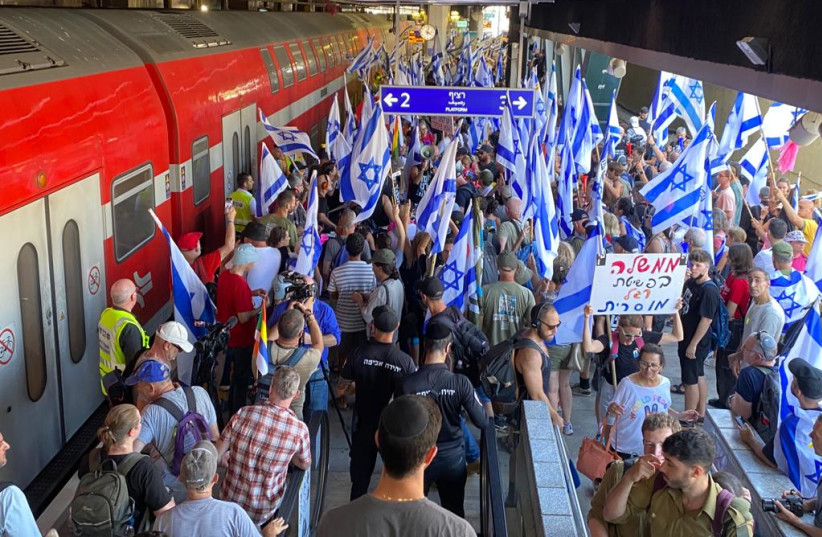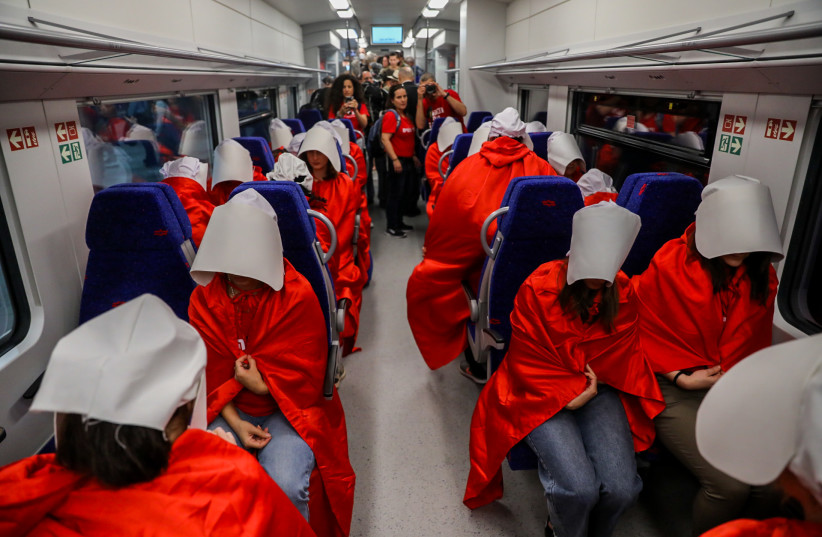President Isaac Herzog, with his upbeat speech to a joint session of Congress on Wednesday, can add a new title to his resume: positive reframer-in-chief.
The way Herzog described the debate, turmoil, and protests in Israel over the judicial overhaul plan to the gathered senators and congresspeople was a master class in cognitive reframing, a virtuoso performance in portraying the bitter as sweet.
Back home in Israel, protesters were blocking roads on almost a daily basis, the police were using water cannons to break up demonstrations, reserve IAF and IDF officers were declaring by the hundreds that they would no longer serve, doctors went out on a two-hour warning strike, public discourse continued to cross all redlines, and reports of minor acts of physical violence increased.
'The clearest tribute to the fortitude of Israel's democracy'
But all of that, in Herzog’s telling, is nothing less than “the clearest tribute to the fortitude of Israel’s democracy.”

In other words, all that bad stuff you see out your window – all the disunity, all the yelling and screaming and pushing, all the angry words and road blocking, all the incivility – is a sign of a kicking, fighting, lively, caring democracy.
“The momentous debate in Israel is painful, and deeply unnerving, because it highlights the cracks within the whole,” he said, adding, however, that “I have great confidence in Israeli democracy. Although we are working through sore issues, just like you, I know our democracy is strong and resilient. Israel has democracy in its DNA.”
These were positive, even optimistic words by the president to the US lawmakers at a time when most in Israel seemed anything but positive and optimistic. There was a palpable dissonance between how Herzog saw things from his perch and how things looked this week at street level.
Because at street level, most Israelis – bombarded with extreme rhetoric on the airwaves, warnings of a civil war, and reports of more and more officers saying they will no longer serve – would be hard-pressed to view all of this as a “tribute to the fortitude of Israel’s democracy.”
Maybe that is how it all looks from 10,000 feet above. But at street level, many perceive what is happening as less the “fortitude of Israel’s democracy” and more the erosion of a critical ingredient to Israel’s survival and success: national solidarity and cohesion.
“COHESION IN the IDF” was a new catchphrase that emerged this week. Chief of Staff Lt.-Gen. Herzi Halevi referenced it during a session with the Knesset’s Foreign Affairs and Defense Committee on Tuesday, during which he addressed the danger of IAF and IDF reservists refusing to serve.
Until now, the danger of this phenomenon has been presented primarily as one that sends the wrong message to Israel’s enemies, a message that Israel’s vaunted military is not what it once was, and that there is disunity in its ranks that bespeaks weakness.
A Yediot Aharonot political cartoon on Wednesday captured this succinctly: It had a caricature of Hezbollah leader Hassan Nasrallah eating popcorn while sitting in front of a television screen with a picture of an Israeli jet over the headline “a crisis in the air force.” “The best movie of the summer,” the cartoon has a gleeful-looking Nasrallah saying.
The danger of refusal to show up for reserve duty has also been presented up until now as one that could affect the air force’s training and preparedness for battle.
Halevi introduced new dimension of concern
But Halevi introduced a new dimension to the concern, one that was echoed this week by several other military officials: that this is all affecting cohesion within IDF units.
Reports are emerging of elite units torn between those opposed to the reform and those in favor, between those reservists who sign one petition saying they will no longer be willing to serve and others saying they will extend their service in the reserves to make up for any shortfall.
Ynet reported on Wednesday that the IDF has begun checking every day whether there are “cohesion incidents” in standing units over the judicial reform, such as heated debates and fights between soldiers. So far, none have been reported, but it is telling that this is something the IDF is checking daily.
One of Israel’s mantras for much of the last 75 years has been the need to “keep the IDF out of politics,” a mantra being abandoned now by all those saying they will not show up for reserve service because of the judicial overhaul. Not only has the IDF been dragged into this political debate, but those behind calls for reservists not to show up want to use the IDF to tip the balance in this debate, to be the ultimate arbiter in this argument.
A mirror image of the slogan “keep the IDF out of politics” is another one, “keep politics out of the IDF.”
Most realize that keeping the IDF out of politics right now is a lost cause – it is being dragged in. But perhaps it is not too late to keep politics out of the IDF, to prevent the passionate and – let’s face it – often angry and hate-filled debate on the street and over the airwaves from infiltrating the barracks. Because this, as the army’s monitoring of these incidents indicates, could have a corrosive effect on the cohesion and fighting spirit of the soldiers.
For instance, officers don’t want their soldiers pursuing terrorists in the narrow streets of Jenin’s refugee camp an hour after shouting at each other over the reasonableness clause. The IDF’s ground units are composed of soldiers from all types of different backgrounds, with all types of different political ideologies, and introducing deep political divisions does nothing to enhance their need to come together when they are called upon to fight as one.
THE ABILITY of this country, despite its myriad differences, to pull together as one in times of crisis to rebuff an enemy is legendary. We witnessed that two weeks ago during the two-day campaign in Jenin and nearly two months earlier during the operation against Palestinian Islamic Jihad in Gaza. But this is all true when facing an external enemy, an external challenge.
Internal challenge
But how about when dealing with an internal challenge? Then can the country pull together? Then, paradoxically, it is more complicated.
Cohesion in the army is essential for national cohesion, and national cohesion and solidarity are two key ingredients to Israel’s extolled resilience, a resilience that is studied and admired around the world and which has less to do with the firepower that the military can muster against an enemy, and more with the ability of the country’s citizens to withstand and endure intense pressure, and then bounce back.
Unity of purpose, shared destiny, a sense of mutual responsibility, and readiness of individuals to commit themselves and sacrifice for the general good make up national solidarity and cohesion.
Unity of purpose, for example, refers to a sense that people are united in their vision, values, and aspirations toward a common goal and are willing to set aside partisan individual interests for the common good. But that is no longer clear, as the judicial overhaul debate has unveiled differences in what exactly Israel’s common goal is or should be.
The same is true of the idea of a shared destiny, as the judicial reform has led to more and more people saying that if the reform – or even parts of it – becomes law, then this is not a country they want to be a part of. Whether or not they actually act on that sentiment is a separate issue; the feeling itself is corrosive to national solidarity and cohesiveness.

And then there is the idea of mutual responsibility and a willingness to sacrifice for the common good. This has long been one of Israel’s greatest strengths, a willingness of people to sacrifice for one another in pursuit of that common goal and shared destiny.
But when officers and soldiers declare they are no longer willing to do reserve service, that is the opposite of mutual responsibility. Rather, it is saying, “No, I am no longer willing to sacrifice for the common good.” Why not? Because the common good, as defined by this government, is not my vision of the good. This is something that erodes national resilience.
As former defense minister Moshe Ya’alon pointed out in a statement he made about national resilience in 2018, the last conventional war Israel fought was the Yom Kippur War in 1973, some 50 years ago. Since then, all of Israel’s battles have been sub-conventional wars, where the target of attacks is not Israel’s military forces but its civilians. This indicates that for Israel’s enemies, the weak link in the chain of the country’s security is national resilience, Ya’alon said.
Israel’s enemies moved their strategy from a confrontation with the IDF, which they realized they could not beat, to concentrating attacks on the home front, where they thought they could chip away at the society’s ability to persevere. Thus far, this strategy has also failed – the country has demonstrated tremendous reserves of resilience against terrorist attacks and sub-conventional warfare. One reason for this is the ability to unite against a clear common enemy for a common purpose.
This time, however, the threat to the country’s resilience is not external but internal. We are threatening our own resilience. This threat to our resilience from within, not from without, is a new type of challenge, and one the last few months have clearly indicated we have not yet mastered.
